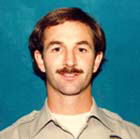Deputy Richard Robert “Rick” McHale, 32, became the first Kern County deputy sheriff to be shot to death in the line of duty in nearly 20 years.
McHale died March 3, at 3:13 p.m. in Kern Medical Center’s intensive care unit, where he had been in grave condition since emergency surgery after being shot in the head the previous evening.
His death ended a long, silent vigil held outside the intensive care unit by dozens of fellow peace officers and their families, and McHale’s friends.
Of McHale’s death, Sheriff’s Department spokesman Richard Dixon said: “It hurts. There’s a lot of pain right now.”
Dixon said McHale was shot once in the head at 5:45 p.m. on March 2, apparently with his 9mm semiautomatic handgun during a fight with a man in the crowded living room of a home.
McHale’s alleged assailant was Jerry Lee Twyman Jr., 26, who lived in the home.
After the deputy was shot, Twyman fatally shot himself in the head, Dixon said.
Dixon tried to reconstruct the murder of McHale and the suicide of his killer.
Twyman’s fiancée, Trina Rawlie, 18, called the Sheriff’s Department at 5:33 p.m. to report that Twyman was throwing furniture and clothing out the back door of the home, and yelling obscenities at her. Rawlie made the call from the home of a neighbor.
Rawlie’s call was the third made to the department that day about Twyman’s behavior. McHale did not respond to either of the first two. En route to the residence on the third call, McHale called for a backup unit. There were six other sheriff’s cars patrolling in the Greater Bakersfield area at the time. The one designated to assist McHale had to come from about four miles from McHale’s location.
Dixon said, “It appears that McHale went into the house, and there was some sort of confrontation between him and the suspect (Twyman).”
Lt. Stan Moe added, “The room was fairly small, and crowded with furniture, so the walking area was even smaller.”
Dixon said, “Our analysis of the physical evidence at the scene shows that there was a struggle, and the guy somehow got McHale’s gun, shot McHale in the head, and then shot himself.” Dixon could not confirm a report that McHale was shot behind his right ear.
Two shots were fired from McHale’s 14-shot handgun.
While court records showed Twyman had no prior criminal record in Kern County, he did spend five days in the San Luis Obispo County Jail in January 1988. Court records indicated he was charged with six misdemeanor offenses, including failure to obey an officer and giving false information to an officer. All but one of the charges, driving a suspended license, was dropped.
There is no formal procedure for deputies to follow in handling one-on-one situations, Dixon said. “You do the best you can, with the training and experience you’ve had.”
McHale joined the Sheriff’s Department on Nov. 23, 1981, as a Deputy Sheriff I, and was promoted to Deputy Sheriff II a year later.
His shooting, Dixon said, points out the perils that patrol officers face each time they respond to even the most seemingly innocent call. McHale was a Kern County patrol deputy for three years, and a patrol deputy for the Los Angeles County Sheriff’s Department for 12 years.
“Any reported crime can be dangerous,” Dixon said. “There are a lot of mean people out there who don’t mind beating other people.”
McHale was one of the five members of the Sheriff’s Criminal Apprehension Team (SCAT). “It was formed,” Dixon said, “to crack down on a particular – crime problem in a particular area.”
As a member of SCAT, McHale had worked undercover for more than a year in a series of ongoing raids on drug dealers in southeast Bakersfield.
McHale, often outspoken, was one of the first law enforcement officials to talk about the burgeoning gang problem in the greater Bakersfield area.
He took it personally when gang members from the Los Angeles ghettos began invading the neighborhoods near Cotton wood Road.
Two days before he was shot, McHale sounded glum.
He said he missed the action in the “five beat” patrol area of Cottonwood. Rosedale and Oildale, he said, were busy but boring.
The SCAT team began in January 1988, although the seeds were sown six months before that when McHale and his partner in the beat, Deputy Ulysses Williams, ran a four-week undercover operation and arrested 14 rock cocaine dealers.
“I’m getting burned out,” McHale said shortly before he went back to patrol. He planned to stay away for about six months, and then apply to return to SCAT.
“It’s hard to see them going on without me,” he said earlier this week.
Deputy Jess Baker remains a member of SCAT, and as a close friend of McHale served as liaison between McHale’s wife, Leslie, and other family members.

